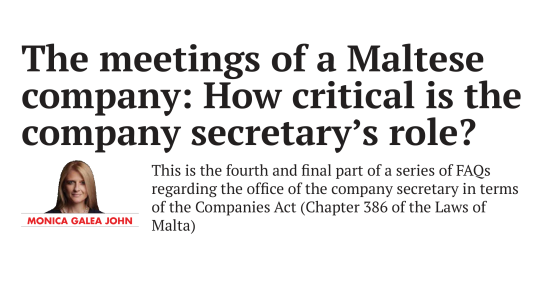Author: Krista Pisani Bencini, Senior Associate – Corporate & Commercial Department
This is the second part of a series of FAQs regarding the office of the company secretary in terms of the Companies Act (Chapter 386, Laws of Malta).
1. Is the office of the company secretary established by law?
The company secretary is an officer of the company, together with the directors, and as such, exercises specific functions and responsibilities at law.
2. Do the functions and responsibilities of the company secretary emanate from the law?
The specific duties and responsibilities of the company secretary primarily emanate from the law (the statutory filings) and from practice (the corporate governance aspect). Additional duties may also arise from the Articles of Association of each respective company.
The Companies Act also imposes a general duty on all officers of a company, including the company secretary, by virtue of Article 150, which states that anything required to be done by a company under any provisions of the Act, shall be deemed also to be required to be done by the officers of the company.
3. Does the company secretary just have administrative duties?
The company secretary does not have a decision-making role and has no right to vote on resolutions.
In practice, the company secretary’s duties, though largely administrative, extend to the quasi-advisory particularly when s/he is exercising its role as a point of contact between the directors, shareholders, the chairman and the advisors, amongst others.
Accordingly, directors are legally bound to appoint an individual who appears to them to have the requisite knowledge and experience to discharge the functions of a company secretary with all that this encompasses.
4. What are the statutory filing obligations of the company secretary as an officer of the company?
Every Maltese company has extensive statutory reporting obligations under the Companies Act, which would typically be handled by the company secretary thus becoming his/her responsibility. These largely relate to the preparation, execution and submission of statutory returns and other documents within the statutory reporting deadlines. These include:
- Documents / returns which are required to be filed with the Malta Business Registry on an annual basis, such as the annual return, the financial statements, and the annual Beneficial Ownership confirmation form (if appliable); and
- Documents /returns which are required to be filed upon the occurrence of specific events, such as a:
- transfer, pledge or allotment of shares,
- change to the officers or the auditor of the company,
- change to the beneficial owner of the company (or the senior managing officials, where no beneficial owner is identified),
- change to the registered address of the company,
- change to the M&As, and
- liquidation
In the case of a licensed entity, some of the reporting obligations may vary and may require the licensing authority’s prior approval.
5. Can the company secretary incur penalties for not carrying out his or her filing duties?
Many provisions of the Companies Act, which impose a filing obligation on a company, contemplate the placing of the officers of the company, including therefore the company secretary, in default and impose liability to a fixed penalty and a daily one when the default continues. Such provisions include the failure by a company to keep proper minutes in terms of Article 149 of the Companies Act.
6. Does the company secretary have a duty towards the chairperson and the Board?
The company secretary plays a key role in ensuring a clear and effective channel of communication between the chairperson and Board. The company secretary is often relied upon by the directors and the chairperson, not only when it comes to filings or to the organising of meetings, but also with respect to corporate governance requirements generally and internal company administration.
7. Does a company secretary have a duty to call meetings?
Although the company secretary does not have a specific duty to call meetings at law, in practice s/he has a number of duties pertaining to meetings, be it those of the Board of directors (and/or its committees, if any), and be it those related to shareholders’ general meetings (including class meetings). Company secretaries should be well versed on the law of meetings generally.
In terms of shareholder meetings, every company must, each year, hold a general meeting as its AGM in addition to any other general meetings. If the AGM is not held, every officer of the company (including the company secretary therefore) is, at law, liable to a penalty and for every day during which the default continues, to a further penalty. This means that the company secretary should take it in hand to ensure that such meetings are held.
8. What other duties does the company secretary have?
The model Articles of Association (First Schedule to the Companies Act, 1995) set out a list of responsibilities of the company secretary which list is often replicated in most statutes. This includes the responsibility for keeping:
- minute books of general meetings and of Board meetings;
- registers of members and debentures; and
- other registers and records (such as the Register of the Beneficial Owners) which the Board may require the company secretary to keep.
The Model Articles also state that the company secretary must ensure that proper notices are given of all meetings and that all returns, and other documents (such as share certificates) of the company are prepared and delivered in accordance with the Companies Act.
In addition to this, the company secretary may have other obligations in terms of other laws such as tax laws and will also inevitably be the interface between the company and the authorities, notably the MBR. In the case of licensed entities, the company secretary will also communicate regularly with the relevant licensing authority, be it the Malta Financial Services Authority, the Malta Gaming Authority or the Malta Stock Exchange, in the case of a listed entity.
For Further assistance in connection with company secretarial matters, please contact:
Dr. Monica Galea John on monica.galeajohn@fenechlaw.com
Dr. Krista Pisani Bencini on krista.pisanibencini@fenechlaw.com
Dr. Sarah Grima on sarah.grima@fenechlaw.com
Dr. Maria DeBono on maria.debono@fenechlaw.com
©Fenech & Fenech Advocates
Disclaimer │ The information provided on this Update does not, and is not intended to, constitute legal advice. All information, content, and materials available are for general informational purposes only. This Update may not constitute the most up-to-date legal or other information and you are advised to seek updated advice.
















